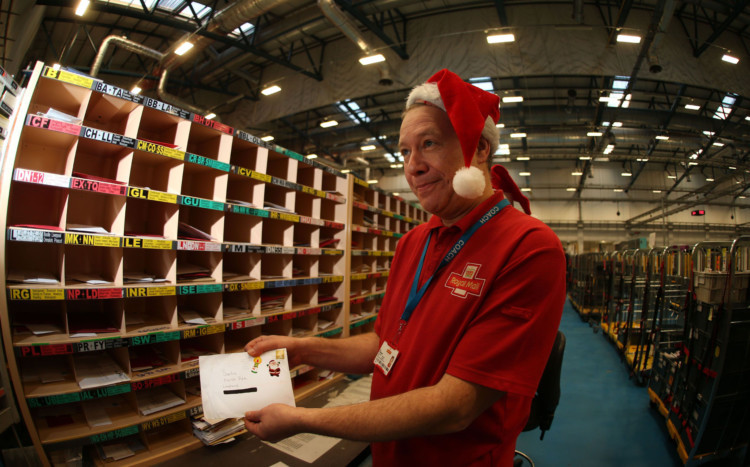
Labour warn that this could be “the last Christmas of Royal Mail as we know it.”
If only Santa could deliver all the presents.
By this time of year almost everyone has come home to find a postcard put through the door by the local postie, telling them he or she was unable to deliver a package and it’s now waiting at the local depot.
That means a trip to a nearby sorting office and standing in a time-consuming queue. But Labour are warning it’s going to get much worse.
Shadow postal affairs minister Ian Murray explained: “This could be the last Christmas of Royal Mail as we know it. Those sorting offices make up one of the big asset bases of Royal Mail.
“As a private company it’s all about profit rather than posties and parcels for Royal Mail now. They might be tempted to sell off those lucrative, city centre sites and move to cheaper out-of-town sites.”
In Murray’s own Edinburgh South constituency that’s already been mooted, with plans to close two local collection centres just a short walk for most customers and replace them with a depot that would require use of a car or involve taking at least two buses to get there followed by carting whatever the parcel might be back on the bus too, of course.
Those proposals have been shouted down, for now.
With Royal Mail now competing in the open market folk are free to use different carriers. But tales of poor service, bashed packages and surly staff at hard-to-find depots concerning other companies are not hard to find.
Murray expects Royal Mail to start selling off valuable property soon. Especially given the news this month that postal workers have agreed a long-term deal on pay and conditions.
He added: “Around 5% of Royal Mail shares are owned by a particularly aggressive hedge fund known for forcing large-scale restructuring on companies. With staff now protected until 2019, the only place to go to boost profits is property.
“A privatised Royal Mail owned by hedge funds makes traipsing to an out-of-town site to collect your parcels more likely.”
He’s also concerned about the future of the traditional letters to Santa service. Children that write to a special address can expect a letter back from Father Christmas, all administered by Royal Mail. But it costs the company cash and, though they say they’ve no plans to axe it, now they are private Royal Mail’s first responsibility is making money.
The problem, according to Murray, comes back to the undervaluation of Royal Mail that saw it sold off for £3.3 billion only for the share price to soar. Goldman Sachs, one of the banks that helped the Government come up with an initial share price of 330p, recently issued advice to its own share-dealing staff not to sell for anything under 610p.
Murray added: “On day one the share price jumped to 450p, meaning the taxpayer lost out to the tune of three-quarters of a billion pounds at a single stroke.
“The offer price was politically motivated to get rid of it.”
Murray points to not just the property portfolio to back him up but previous valuations that priced Royal Mail at as much as £10 billion even when it wasn’t making anything like the profits it does now. And he dismisses the argument that privatisation was necessary to inject cash into the company.
“They said it needed an injection of capital in the region of £1.6 billion. Royal Mail made an £800 million profit last year and it will this year, too.”
In fact, Labour claims that the Coalition Government are developing a habit of flogging off viable state-run businesses.
While the Government claims operations like Royal Mail are in competition with more important demands on their funds like hospitals and schools, Labour point out that, given Royal Mail was making money, it could still be contributing to state funds not draining them.
Added Murray: “Royal Mail was profitable and has been sold off. The east coast railway line is profitable and is being sold off.
“According to this month’s infrastructure statement Eurostar will be sold off though it, too, is profitable. Industries owned by the taxpayer that make money are being sold off on the cheap.”
The question is, what will Labour do about it?
Murray won’t commit to renationalise Royal Mail, claiming that the soaring value of the company will make it too expensive to bring back into public hands.
He said: “I can’t commit to write a blank cheque.”

Enjoy the convenience of having The Sunday Post delivered as a digital ePaper straight to your smartphone, tablet or computer.
Subscribe for only £5.49 a month and enjoy all the benefits of the printed paper as a digital replica.
Subscribe